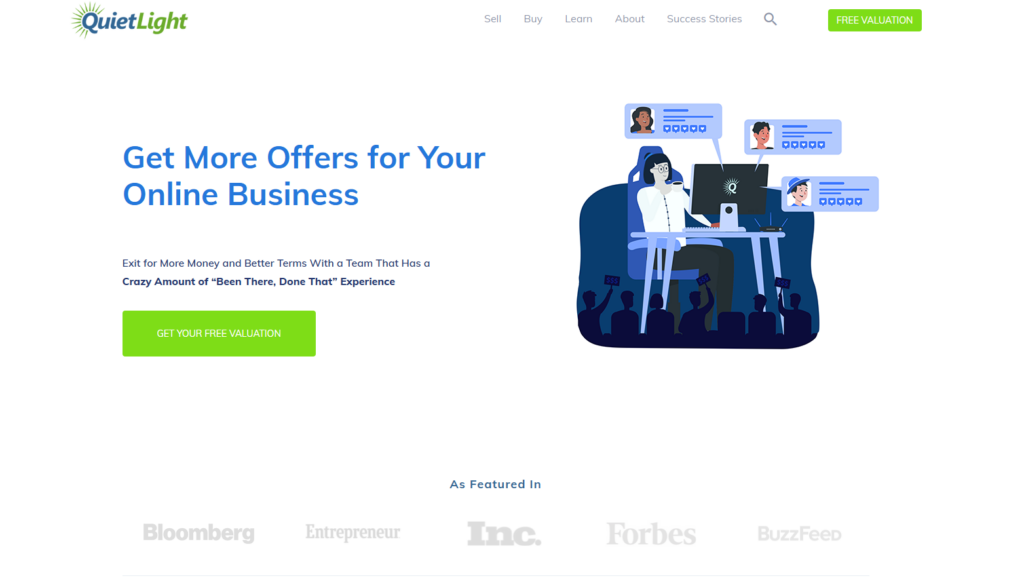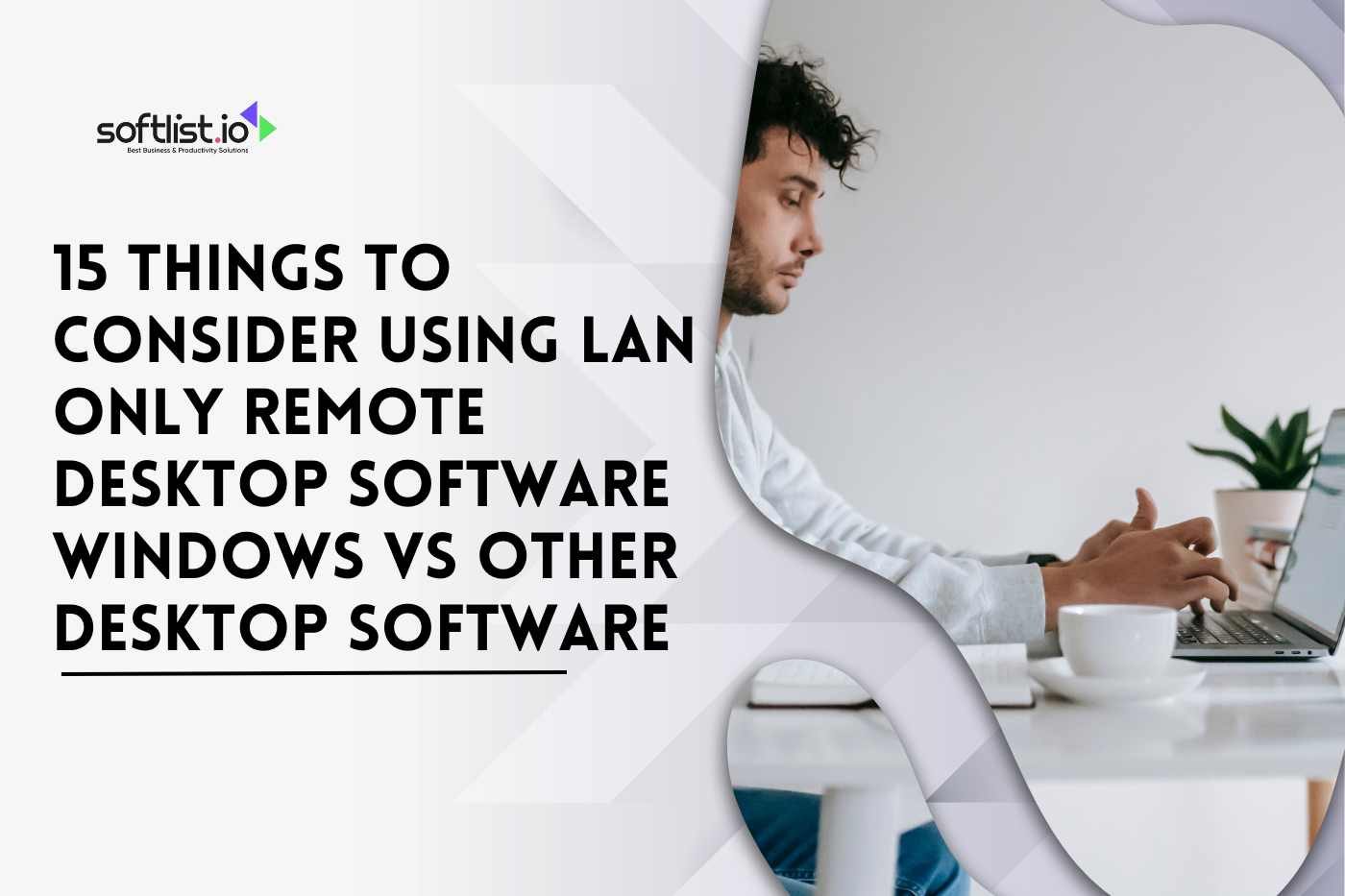Acquiring an online business can be a game-changer for entrepreneurs looking to enter the digital marketplace. Whether you’re a first-time buyer or a seasoned investor, working with a reputable brokerage like Quiet Light Brokerage can significantly streamline the process. With expert guidance, vetted listings, and a structured acquisition process, buyers can confidently navigate the complexities of online business purchases.
This guide walks you through each step of purchasing an online business using Quiet Light, highlighting key benefits, due diligence measures, and post-sales support.
Key Takeaways
- Buying an established online business offers immediate revenue and lower risk compared to starting from scratch.
- Quiet Light Brokerage simplifies the process for those looking to buy or sell an online business with vetted listings, transparent financials, and expert support.
- Thorough due diligence, including financial and operational reviews, is crucial for a secure investment.
- The Letter of Intent (LOI) and final agreement formalize negotiations and protect both buyers and sellers.
- Post-sale support, including transition assistance and training, ensures business continuity and long-term success.
Why Buy an Online Business?

Purchasing an established online business offers a fast-track route to success compared to starting one from scratch. Instead of spending years developing a brand, finding customers, and fine-tuning operations, buying an existing business provides a head start with several key advantages:
1. Immediate Revenue Generation
Starting a new business often involves months or even years of investment before seeing significant returns. When you purchase an established online business, you gain access to immediate cash flow from existing operations. This means you can start generating revenue immediately rather than waiting to build traction.
2. Proven Business Model
One of the biggest risks in starting a new venture is determining whether the business model is viable. By buying an established business, you inherit a tested and optimized framework that has already proven successful. This reduces trial and error and allows you to focus on scaling the business rather than figuring out if it will work.
3. Established Customer Base
Acquiring an online business means you don’t have to start from zero in terms of attracting customers. A pre-existing business comes with a loyal customer base, email lists, and potentially a community that trusts the brand. This significantly reduces the time and resources needed for marketing and customer acquisition.
4. Less Risky Investment
Uncertainty is high when launching a business from scratch, and failure rates can be daunting. However, purchasing an existing business allows you to analyze financial records, website traffic, conversion rates, and customer retention metrics before deciding. This data-driven approach helps mitigate risk and ensures you invest in a sustainable business.
5. Growth Opportunities
Scaling a business is often easier than starting one. Buying an online business allows you to focus on improving operations, expanding product offerings, or optimizing marketing strategies rather than laying the groundwork from the beginning. With an existing foundation in place, you can implement strategies to drive growth and increase profitability faster.
How Quiet Light Brokerage Simplifies the Acquisition Process

Image Source: quietlight.com
Finding the right online business to buy can be overwhelming, but working with a reputable brokerage firm like Quiet Light Brokerage streamlines the process. They provide:
- A curated list of vetted businesses – Ensuring that only profitable and well-established businesses are listed.
- Transparent financial and operational data – Helping buyers make informed decisions.
- Expert guidance and due diligence support – Reducing risks associated with online business acquisitions.
Step-by-Step Guide to Buying an Online Business
Buying an online business involves a structured process that includes initial consultation, due diligence, negotiation, and post-sale support to ensure a smooth transition. This guide from Quiet Light provides a detailed roadmap to help buyers confidently assess, acquire, and manage a profitable online business.
Step 1: Initial Consultation

Before exploring available online businesses, it’s crucial to start with an initial consultation with a Quiet Light advisor. This no-obligation session lays the foundation for a smooth buying process by helping you:
- Understand the Buying Process – Get a clear roadmap of what to expect, from due diligence to closing the deal.
- Define Your Investment Goals – Identify what type of online business aligns with your expertise, interests, and financial objectives.
- Assess Your Financial Readiness – Determine how much capital you need and explore financing options if required.
- Gain Expert Insights into Market Trends – Understand industry trends, valuation methods, and potential risks to make informed decisions.
Quiet Light’s advisors are seasoned entrepreneurs and acquisition specialists who have successfully bought and sold online businesses, helping business owners navigate complex transactions with confidence. Their guidance ensures that buyers avoid common pitfalls, evaluate businesses effectively, and find opportunities that align with their goals.
This initial step is essential to streamlining the acquisition process, helping buyers make confident, data-driven decisions before moving forward. Read more about Quiet Light’s advisory services to get started.
Step 2: Explore Vetted Listings
Once you’ve completed your initial consultation, the next step is to explore vetted listings curated by Quiet Light Brokerage. These listings include a diverse range of online businesses, such as:
- E-commerce Stores – Online retail businesses with established customer bases and revenue streams.
- SaaS Platforms – Software-as-a-Service businesses with recurring subscription models.
- Affiliate Websites – Content-based sites that generate revenue through affiliate marketing commissions.
- Amazon FBA businesses – E-commerce businesses that leverage Amazon’s Fulfillment by Amazon (FBA) program for streamlined storage, shipping, and customer service.
Each listing is thoroughly vetted and includes key performance indicators (KPIs) like revenue, net profit, and traffic data. These insights allow buyers to compare opportunities, assess profitability, and evaluate long-term growth potential before making an offer.
Quiet Light ensures transparency by providing detailed financials, operational history, and business performance metrics. This step helps buyers narrow down businesses that align with their expertise, risk tolerance, and investment goals.
Step 3: General Discovery and Due Diligence

After identifying a business of interest, the next step is general discovery and due diligence to verify its financial and operational viability. This involves:
- Reviewing Financial Statements – Analyze revenue, expenses, and profit margins to ensure financial stability.
- Analyzing Traffic Sources and Conversion Rates – Evaluate where customers come from and how effectively the business converts visitors into buyers.
- Assessing Business Scalability – Determine growth potential, market demand, and expansion opportunities, all of which are key factors for a potential buyer to evaluate.
- Engaging in Discussions with the Seller – Ask critical questions to understand business operations, challenges, and future opportunities.
Quiet Light Brokerage provides buyers with comprehensive documentation to ensure transparency and help verify key claims. This due diligence step is essential in mitigating risks and making a well-informed acquisition decision. Learn more about Quiet Light Brokerage’s due diligence approach to ensure a smooth and secure buying process.
Step 4: Submitting a Letter of Intent (LOI)

Once you’ve completed due diligence and are ready to move forward, the next step is to submit a Letter of Intent (LOI) to the seller. This formal document outlines:
- Proposed Purchase Price – The amount you’re offering to buy the business.
- Terms of Sale – Payment structure, financing details, and key conditions.
- Due Diligence Period – A timeline for verifying final details before closing.
- Special Conditions – Any contingencies, such as financing approval or transition assistance.
Once the seller accepts your LOI, the business enters an exclusive negotiation phase, temporarily removing it from the market while you finalize the purchase details with the potential buyer. This step helps ensure both parties agree on expectations before reaching the final agreement. Learn more about LOI agreements and their role in securing an online business acquisition.
Step 5: Final Due Diligence

Before finalizing the purchase, conduct final due diligence to ensure the business is a sound investment. This involves verifying:
- Revenue Streams and Profitability – Confirm income sources, recurring revenue, and profit margins.
- Legal Obligations and Trademarks – Check business licenses, intellectual property rights, and any pending legal matters.
- Customer Retention Rates – Assess how well the business retains customers and the stability of its revenue.
- Operational Workflows – Review daily operations, supplier relationships, and fulfillment processes.
This step is crucial to identifying potential risks and preventing costly surprises post-acquisition, ensuring that you invest in a business that’s financially stable and operationally sound. Quiet Light Brokerage provides detailed documentation and expert support, ensuring buyers can access accurate, transparent data. See how their process works to make informed, confident purchasing decisions.
Step 6: Negotiation and Final Agreement

After completing due diligence, the next step is negotiating and finalizing the purchase agreement. This legally binding contract covers:
- Payment Terms – Specifies the total purchase price, payment structure, and any financing agreements.
- Asset Transfer Details – Outlines what is included in the sale, such as domains, customer lists, and intellectual property.
- Training and Transition Support – Defines any post-sale assistance from the seller to ensure a smooth handover.
- Legal Protections – Establishes warranties, non-compete clauses, and any contingencies to protect both parties.
This agreement formalizes the transaction and ensures clarity on rights, responsibilities, and expectations. Quiet Light provides standardized contracts to simplify the process and safeguard both buyers and sellers. Learn more about their contract structures for a secure acquisition.
Step 7: Transition Planning

Once the purchase agreement is signed, the focus shifts to transition planning to ensure a smooth handover. Key tasks include:
- Setting Up Merchant Accounts and Payment Processors – Configure financial systems for seamless transactions.
- Transferring Domain Ownership – Move website domains, hosting, and email accounts under your control.
- Migrating Customer Databases and Marketing Assets – Secure customer lists, email campaigns, and advertising accounts.
- Learning Operational Workflows – Gain hands-on training from the seller to manage daily business functions effectively
A well-planned transition minimizes disruptions and allows you to take control of operations efficiently. Quiet Light provides structured guidance throughout this phase, ensuring buyers and those who want to sell receive the necessary tools and knowledge for a successful ownership transfer. Learn more about the transition process to maximize business continuity.
Step 8: Post-Sale Support

Even after the deal is finalized, Quiet Light offers post-sale support to ensure a seamless transition. This includes:
- Migration Assistance – Helping transfer technical assets such as website hosting, email accounts, and software integrations.
- Seller Training – Providing hands-on guidance so the new owner fully understands business operations and workflows.
- Ongoing Support – Assisting with challenges during the initial ownership phase, such as troubleshooting issues or optimizing processes.
This continued support minimizes disruptions and allows buyers to confidently take complete control of their new business. With Quiet Light’s expert guidance, new owners can navigate the learning curve more smoothly and ensure long-term success. Learn more about their post-sale support to maximize the value of your acquisition.
Summary of Steps to Buying an Online Business
This structured content matrix outlines the key steps in acquiring an online business, from initial consultation to post-sale support, ensuring a smooth and informed purchasing process.
| Step | Description | Key Actions |
| Step 1: Initial Consultation | Get expert guidance and define your investment goals. | Consult a Quiet Light advisor, assess financial readiness, and understand the acquisition process. |
| Step 2: Explore Vetted Listings | Review curated online business listings based on financial and operational metrics. | Compare business models, analyze key performance indicators (KPIs), and identify potential opportunities. |
| Step 3: General Discovery & Due Diligence | Verify the business’s financial and operational health before proceeding. | Review financials, analyze traffic and conversions, assess scalability, and engage with the seller. |
| Step 4: Submit a Letter of Intent (LOI) | Make a formal offer with terms and conditions to secure exclusive negotiations. | Outline purchase price, sale terms, due diligence period, and contingencies. |
| Step 5: Final Due Diligence | Conduct final checks to confirm financial stability and operational workflows. | Verify revenue, legal obligations, trademarks, customer retention, and supplier relationships. |
| Step 6: Negotiation & Final Agreement | Sign a legally binding contract outlining payment, asset transfer, and legal protections. | Finalize payment structure, transition support, and non-compete clauses. |
| Step 7: Transition Planning | Ensure a smooth handover of operations and assets. | Transfer domains, payment processors, marketing assets, and learn operational workflows. |
| Step 8: Post-Sale Support | Get ongoing support to optimize business operations. | Receive seller training, migration assistance, and guidance during the transition phase. |
Key Benefits of Using Quiet Light Brokerage

Quiet Light Brokerage offers a seamless and transparent process for those looking to sell an online business or buy one with expert guidance. Their expert team, vetted listings, competitive fees, and extensive support services make them a trusted partner for entrepreneurs looking to acquire or exit a business.
1. Experienced Advisors
Quiet Light’s team consists of seasoned professionals who have successfully bought and sold online businesses themselves. Their first-hand experience allows them to provide strategic insights, risk assessments, and tailored guidance, ensuring buyers and sellers make informed decisions. This expertise reduces uncertainty and helps clients navigate the complexities of online business acquisitions.
2. Vetted Business Listings
Every business listed on Quiet Light undergoes rigorous screening to confirm financial stability, operational efficiency, and long-term growth potential. Buyers can trust that they are reviewing high-quality businesses with verified data, reducing the risk of investing in underperforming assets.
3. Competitive Commission Fees
Quiet Light offers lower commission fees, especially for acquisitions under $1 million, making them a cost-effective choice whether you’re looking to sell your business or buy one. Their transparent pricing structure ensures buyers and sellers get the most value from their transactions without excessive brokerage fees.
4. Extensive Buyer-Seller Network
With an extensive network of qualified buyers and sellers, Quiet Light increases the chances of finding the right match for your investment goals. This broad market reach enables faster deals and greater access to lucrative opportunities across various industries, including e-commerce, SaaS, and content-based businesses.
5. Efficient Transactions
Quiet Light’s 85% closing rate within 90 days highlights their ability to facilitate smooth, timely acquisitions. Their structured process eliminates unnecessary delays, helping buyers secure businesses quickly and sellers achieve successful exits with minimal hassle.
6. Comprehensive Support Services
From legal documentation to website migration, Quiet Light provides full-service support to ensure a stress-free buying experience. Their hands-on approach simplifies the transaction process, allowing buyers and those looking to sell a business to focus on their next steps rather than administrative challenges.
Conclusion
Buying or selling a business is a significant investment that requires careful planning, research, and execution. With Quiet Light Brokerage, buyers benefit from expert guidance, vetted business opportunities, and a structured process that simplifies acquisition. By following this step-by-step guide, you can confidently navigate the buying journey and secure a profitable online venture.
Ready to invest? Explore Softlist.io for expert insights, valuation strategies, and actionable advice to maximize your online business’s value before selling. Get the data-driven guidance you need to make informed decisions and boost your business’s market appeal today!
FAQs
How Long Does It Typically Take To Complete an Online Business Purchase Through Quiet Light Brokerage?
The timeline varies depending on the complexity of the transaction, but on average, deals close within 30 to 90 days. Factors such as due diligence, financing, and negotiations can affect the duration.
Can I Finance the Purchase of an Online Business Instead of Paying the Full Amount Upfront?
Yes, buyers often use financing options such as SBA loans, revenue-based financing, or seller financing to acquire an online business. Quiet Light Brokerage can provide guidance on viable financing strategies.
What Are Some Red Flags to Watch for When Evaluating an Online Business Listing?
Common red flags include inconsistent financial records, declining traffic trends, over-reliance on a single revenue stream, high customer churn rates, and pending legal issues, all of which can significantly impact business valuation. Conducting thorough due diligence helps mitigate these risks.
Do I Need Prior Experience Running an Online Business Before Making a Purchase?
While prior experience can be helpful, it’s not mandatory. Many online businesses come with transition training from the seller, and Quiet Light provides resources to help buyers adapt and scale their new acquisition effectively.
What Happens If the Business Underperforms After the Purchase?
Once the transaction is completed, the new owner assumes full responsibility. However, having a solid post-acquisition strategy, leveraging transition support, and continuously optimizing business operations can help maintain profitability and growth.






